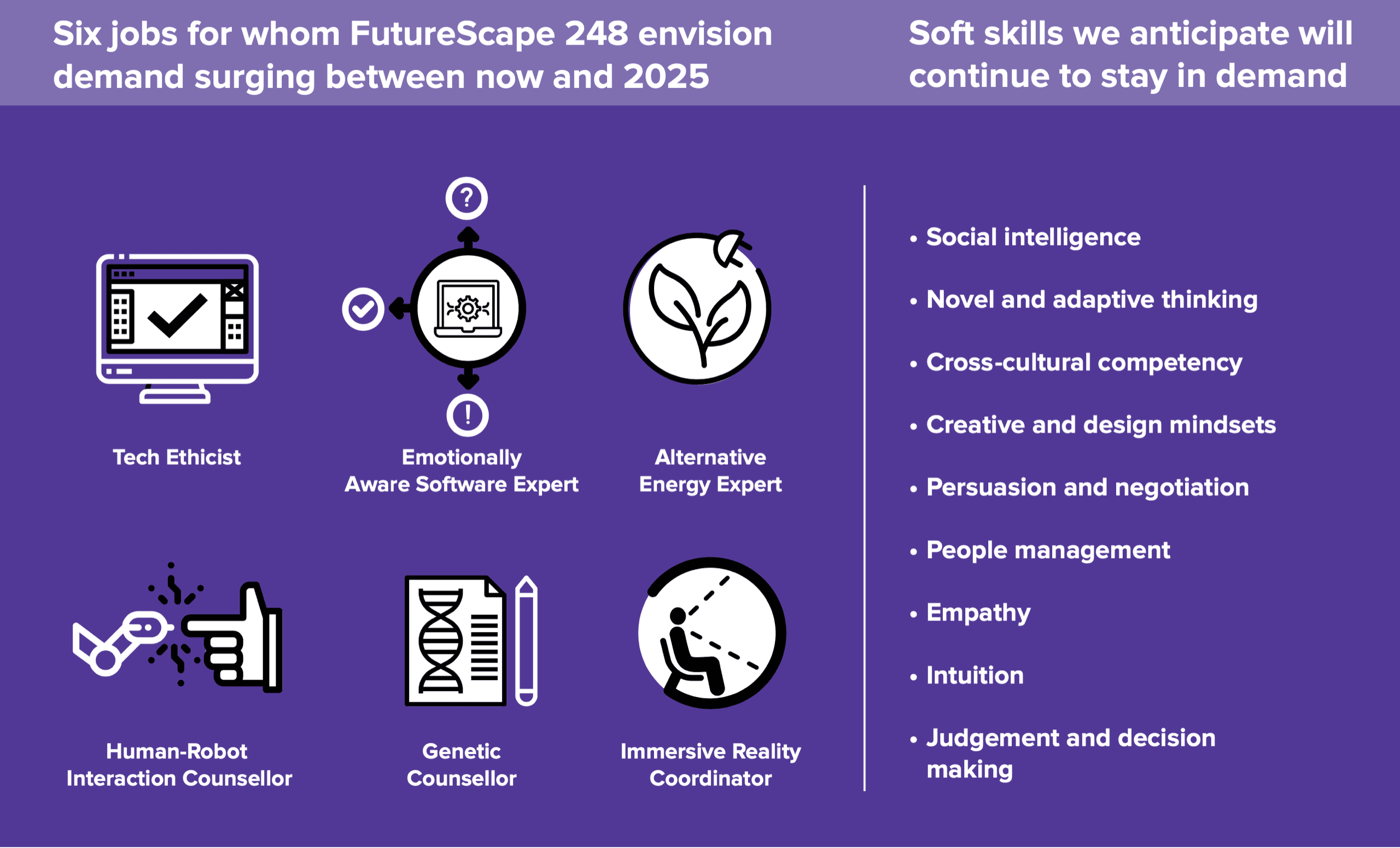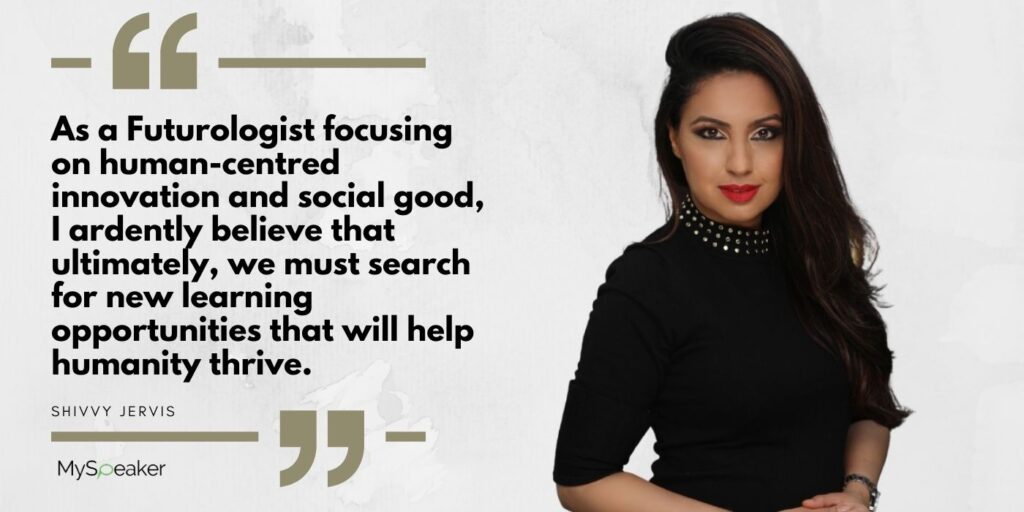The mature employee boldly transitioning to a new career or hold on to their current role, an aspiring freelancer trying to make their way in a digital marketplace, the gig economy worker dropping off our dinner or the bright-eyed undergraduate navigating their physical or digital campus… a singular goal links them all. The desire to enhance their potential, sustain a livelihood and ultimately, progress and plough ahead.
Could we absorb information more effectively if taught in a way that is deeply personalised to each of our unique styles of learning? Can we extend our active learning phase beyond the traditional education that takes place during the first two decades of our lives?
Which forces or elements will shape how we learn, our motivation to do it and where it takes place? Will the next wave of learning call for a campaign or a global movement; or might a quiet, organic shift spark and sustain momentum?
 I set out to ask these burning questions and more with my social innovation forecasting lab FutureScape 248 for four months last year. We then unveiled the Future of Learning: 2020 to 2025 report late last year. What motivated me to embark on this?
You see, it struck me that as young children – particularly under the age of seven – we are taught heavily via play and the stoking of our imagination. However, we are mostly expected, save for some startup environments, to abandon this playful mindset and deal largely in the language of spreadsheets and endless slide decks as soon as we commence our working lives.
And yet, our ability to learn effectively through the act of discovery, field trips and imagination, does not dissipate solely because we are 30 and not 13.
In fact, research shows we need a particular cocktail of chemicals and neurotransmitters to learn effectively.
The toolkits we equip ourselves with must engage multiple senses even when we have our “grown-up” hats on.
There’s a phrase I recall hearing during my childhood that has stayed with me across my life trajectory – “knowledge is power”. My parents didn’t mean power in the context of status or influence, rather that a deeper understanding enriched your ability to make an informed decision or even catalyse change.
In a year full of uncertainty stemming from a global pandemic and economic turbulence, it is more crucial than ever to take stock and investigate how “learning”, both educational and professional, will evolve, and what it will take to elevate it.
We are already halfway through the fourth industrial revolution or “Industry 4.0”, and we continue to see technological and scientific breakthroughs spark systemic change across nearly every sector. According to the Tech Nation 2020 report, the global digital economy is worth $11.5 trillion and continues to thrive. London remains a steady breeding ground for emerging advances in tech that have meaningful social impact.
Technological and societal progress must surge in unison. I’ve articulated this quite literally from the rooftops for nearly a decade – on a soaring stage to 3,000 wonderful people during an opening keynote and an online broadcast to the virtual stratosphere.
As the dynamics of our social and working environments twist and turn, the very act of learning is evolving. Neuroscience studies show we stand to absorb up to four times more, when we use immersive mediums. E-learning has been found to require 40 to 60% less time to learn a subject than traditional classroom settings, so enabling advancements such as emotionally-aware AI, means education can finally start to adapt to each of our unique ways of learning.
This is what drove me to take on this ambitious investigation for the Mayor of London’s office (London & Partners) which in turn identified four principal themes that stand to influence learning now and through to 2025:
1// A rapidly shifting wave of specialisms is shaping the workplace. Which skillsets will best equip us to cope with our collective futures and how useful will skills we already possess in our toolbelt prove to be?
2// Emerging advancements slowly entering the mainstream are shaping the very experience of learning itself with breakthroughs such as emotionally aware software that can perceive the learner’s mood, adaptive learning systems that respond to each of our unique ways of learning, and a mind-bending Internet of Touch.
3// Our on and offline worlds stand to be augmented, with digital content and experiences overlaid onto our real worlds, keeping us firmly in our own reality and yet enhancing it dynamically.
4// As different forces shift the work and learning environment around us, we must evolve our ideas about when and how education takes place. From a learn-then-work approach, might we see more nonlinear trajectories?
As a Futurologist focusing on human-centred innovation and social good, I ardently believe that ultimately, we must search for new learning opportunities that will help humanity thrive.
We are united in our desire to prepare best as we can for our collective futures, to understand the “now” and the “next”. And ultimately, to responsibly enhance human potential and create an uplifting legacy for those who will inherit this future.
DOWNLOAD THE FREE REPORT HERE
I set out to ask these burning questions and more with my social innovation forecasting lab FutureScape 248 for four months last year. We then unveiled the Future of Learning: 2020 to 2025 report late last year. What motivated me to embark on this?
You see, it struck me that as young children – particularly under the age of seven – we are taught heavily via play and the stoking of our imagination. However, we are mostly expected, save for some startup environments, to abandon this playful mindset and deal largely in the language of spreadsheets and endless slide decks as soon as we commence our working lives.
And yet, our ability to learn effectively through the act of discovery, field trips and imagination, does not dissipate solely because we are 30 and not 13.
In fact, research shows we need a particular cocktail of chemicals and neurotransmitters to learn effectively.
The toolkits we equip ourselves with must engage multiple senses even when we have our “grown-up” hats on.
There’s a phrase I recall hearing during my childhood that has stayed with me across my life trajectory – “knowledge is power”. My parents didn’t mean power in the context of status or influence, rather that a deeper understanding enriched your ability to make an informed decision or even catalyse change.
In a year full of uncertainty stemming from a global pandemic and economic turbulence, it is more crucial than ever to take stock and investigate how “learning”, both educational and professional, will evolve, and what it will take to elevate it.
We are already halfway through the fourth industrial revolution or “Industry 4.0”, and we continue to see technological and scientific breakthroughs spark systemic change across nearly every sector. According to the Tech Nation 2020 report, the global digital economy is worth $11.5 trillion and continues to thrive. London remains a steady breeding ground for emerging advances in tech that have meaningful social impact.
Technological and societal progress must surge in unison. I’ve articulated this quite literally from the rooftops for nearly a decade – on a soaring stage to 3,000 wonderful people during an opening keynote and an online broadcast to the virtual stratosphere.
As the dynamics of our social and working environments twist and turn, the very act of learning is evolving. Neuroscience studies show we stand to absorb up to four times more, when we use immersive mediums. E-learning has been found to require 40 to 60% less time to learn a subject than traditional classroom settings, so enabling advancements such as emotionally-aware AI, means education can finally start to adapt to each of our unique ways of learning.
This is what drove me to take on this ambitious investigation for the Mayor of London’s office (London & Partners) which in turn identified four principal themes that stand to influence learning now and through to 2025:
1// A rapidly shifting wave of specialisms is shaping the workplace. Which skillsets will best equip us to cope with our collective futures and how useful will skills we already possess in our toolbelt prove to be?
2// Emerging advancements slowly entering the mainstream are shaping the very experience of learning itself with breakthroughs such as emotionally aware software that can perceive the learner’s mood, adaptive learning systems that respond to each of our unique ways of learning, and a mind-bending Internet of Touch.
3// Our on and offline worlds stand to be augmented, with digital content and experiences overlaid onto our real worlds, keeping us firmly in our own reality and yet enhancing it dynamically.
4// As different forces shift the work and learning environment around us, we must evolve our ideas about when and how education takes place. From a learn-then-work approach, might we see more nonlinear trajectories?
As a Futurologist focusing on human-centred innovation and social good, I ardently believe that ultimately, we must search for new learning opportunities that will help humanity thrive.
We are united in our desire to prepare best as we can for our collective futures, to understand the “now” and the “next”. And ultimately, to responsibly enhance human potential and create an uplifting legacy for those who will inherit this future.
DOWNLOAD THE FREE REPORT HERE
Article is written by Shivvy Jervis. She is recently named one of ten most trailblazing entrepreneurs of Asian origin as the Founder of ambitious social innovation advisory FutureScape 248, Shivvy has proven herself to be one of the most illuminating Futurists of her time. Shivvy talks about The Future of Work, Breakthrough Technologies to Grow Business, Leading a Powerful Digital Transformation and Future of Learning Read more about Shivvy Jervis !
